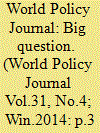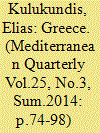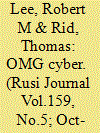|
|
|
Sort Order |
|
|
|
Items / Page
|
|
|
|
|
|
|
| Srl | Item |
| 1 |
ID:
136705


|
|
|
|
|
| Summary/Abstract |
Leo Strauss is often depicted as a sinister neocon guru whose ideas led directly to endless wars in the Middle East. Robert Howse’s worthy, academic Leo Strauss: Man of Peace correctly argues that this is bunk.
|
|
|
|
|
|
|
|
|
|
|
|
|
|
|
|
| 2 |
ID:
136471


|
|
|
|
|
| Summary/Abstract |
Europe is in the throes of a crisis of identity springing from deep economic distress in many of its member states and political divisions both within and without. World Policy Journal asked a European panel of experts—from France to Bulgaria to Sweden—how this crisis is affecting their corner of the continent and what their countries need to remain viable.
|
|
|
|
|
|
|
|
|
|
|
|
|
|
|
|
| 3 |
ID:
136147


|
|
|
|
|
| Summary/Abstract |
Crises can force leaders and technocrats together, highlight failures and, more rarely, precipitate changes in ideological worldview and the prevailing consensus. In 2007–8, the worst financial and economic crises since the Great Depression of 1929 caused a paradigm shift in financial and regulatory ideology. G20 leaders and central bankers reasserted collective power and authority over financial markets and global banks to an extent and in a manner not seen since the collapse of the Bretton Woods system in 1971. The retreat of state authority reversed direction. The spell of the ‘mystical Anglo-Saxon model of liberalisation and deregulation’ was broken. In 2014 the paradigm shift is still underway and still under attack by recalcitrant bank CEOs and their lobbyists, but the shift may be durable—signalling a major change in international regulation of the world's largest financial markets and firms.
|
|
|
|
|
|
|
|
|
|
|
|
|
|
|
|
| 4 |
ID:
134543


|
|
|
|
|
| Summary/Abstract |
The European Union’s sovereign debt and banking crisis has made apparent a gnawing gap between the northern and southern parts of Europe. Over the course of this past half decade, this divide has been brought into the public debate through a myriad of perspectives, from social trust to competitiveness. Yet, the governance sources of the divide are underestimated in policy practices and misrepresented in the political discourse. A governance approach can help clarify why the pursuit of convergence underpinning EU crisis-resolution mechanisms has become a contributing factor, rather than a prospective solution to the North-South gap. In doing so, governance also forms the basis for recommendations to policymakers in both halves of the continent, especially when confronted with the challenge of populist Euroscepticism.
|
|
|
|
|
|
|
|
|
|
|
|
|
|
|
|
| 5 |
ID:
136567


|
|
|
|
|
| Summary/Abstract |
In 2014, the CURRENCY devaluation and inflationary spike dented the president’s popularity and eroded perceptions of her government’s economic competence.
|
|
|
|
|
|
|
|
|
|
|
|
|
|
|
|
| 6 |
ID:
134451


|
|
|
|
|
| Summary/Abstract |
Structural adjustment programs of the International Monetary Fund (IMF) are often blamed for disrupting social relations by forcing austerity on vulnerable people and introducing unpopular liberalization policies. Some suggest that such interventions harm ethnic relations in developing countries because they are insensitive to the tenuous social bargains that often preserve ethnic peace. Moreover, during crises, dominant groups may seek to displace the pain of reform on others, the ethnic division of labour may be affected differentially by reform policies, and ethnic entrepreneurs could use moments of crisis to their advantage. We test the propositions by using unique data measuring the level of ethnic tensions in a country. The results show that IMF interventions reduce conditions of ethnic enmity. These results are robust to fixed effects estimation, endogeneity and selection effects. Moreover, IMF interventions lower ethnic tension in countries that are highly fractionalized, but they are more problematic where larger groups face each other and when larger groups are excluded from state power. These results suggest too that IMF interventions may lead to greater empowerment of excluded groups who might agitate for change during periods of economic crisis. On balance, IMF interventions, relative to continued economic woe, pacify ethnic relations in crisis-ridden countries. We find no evidence to suggest that IMF programs increase ethnic tensions, which is good news for poor countries requiring cheap loans and assistance with reforms.
|
|
|
|
|
|
|
|
|
|
|
|
|
|
|
|
| 7 |
ID:
134755


|
|
|
|
|
| Summary/Abstract |
Inconvenient truths about Greece’s current economic predicament are not often heard in today’s Greece, especially if they conflict with the picture presented by the Greek government. When they are heard, they are usually put down to adverse propaganda or positions of vested interests from abroad. This lack of meaningful dialogue is the product of an environment of disrespect for objective reporting, a surrender to cultural stereotyping, and a sense of hopelessness among the population, all of which are made more destructive by the overwhelming burden of debt. The roots of Greece’s current ills lie also in the political abuses of its past, for which many of the present leaders have a share of responsibility. This essay presents a detailed picture of today’s Greece with special emphasis on sociopolitical issues that are likely to lead to one of three possible outcomes. A clear consideration of these can enable Greece to choose its destiny—instead of having it being thrust upon the country—and in the process succeed in achieving real reform.
|
|
|
|
|
|
|
|
|
|
|
|
|
|
|
|
| 8 |
ID:
136890


|
|
|
|
|
| Summary/Abstract |
Amid the economic crisis in Russia, the likelihood of President Vladimir Putin replacing his prime minister is increasing, Alisa Lockwood and Anna Arutunyan look at Putin’s need to protect his own position, and who could be chosen to replace Dmitry Medvedev.
|
|
|
|
|
|
|
|
|
|
|
|
|
|
|
|
| 9 |
ID:
136133


|
|
|
|
|
| Summary/Abstract |
Today even raising the question of an economic integration agreement between the European Union and the Eurasian Economic Union seems a non-starter. Recent economic sanctions have severely hurt economic cooperation between the two political entities. Yet the foundations of any new institution are frequently set out in times of crisis.
|
|
|
|
|
|
|
|
|
|
|
|
|
|
|
|
| 10 |
ID:
135363


|
|
|
|
|
| Summary/Abstract |
For many austerity-hit Western countries, the defence budget has been a prime target for significant cuts. Nowhere has this been more apparent than in the United States. Yet one element of the Pentagon's budget continues to grow: cyber. High-profile security breaches at the corporate level and reports of cyber-espionage at the national level seemingly justify the vast sums involved in ensuring cyber-security. However, Robert M Lee and Thomas Rid argue that ‘cyber-angst’ is damaging – and self-serving. In this article, they list thirteen reasons why such cyber-security hype is counterproductive.
|
|
|
|
|
|
|
|
|
|
|
|
|
|
|
|
| 11 |
ID:
134268


|
|
|
|
|
| Summary/Abstract |
Europe is facing both a political crisis of democracy and legitimacy and an economic crisis of debt and competitiveness. These crises seem to point in two distinct directions, growing social unrest over the Europeanized mechanisms of economic adjustment, and increasing efforts at strengthening those same institutions that regulate the adjustment process. Recent analyses have suggested that this failure of democracy will prove decisive; legitimacy for crisis management efforts requires a redemocratization of the European polity. Instead, drawing on an analysis of ordo- and neo-liberal traditions, the article explains how European integration was itself a response to the perceived threat of democratic demands at the domestic level. The body of the article then traces the crisis through three phases, arguing that efforts by state managers reflect a deliberate attempt to depoliticize policy-making processes. Yet the selective intervention—to restore accumulation whilst withdrawing social spending—has only fuelled the politicization of segments of European society. This threatens to test the limits of depoliticization as a governing strategy.
|
|
|
|
|
|
|
|
|
|
|
|
|
|
|
|
| 12 |
ID:
134485


|
|
|
|
|
| Summary/Abstract |
Why has Piketty's Capital become a publishing sensation? Not for revolutionary findings; its message that western societies have experienced increases in inequality of income and wealth over the long term is hardly new. Of the several reasons discussed in this article, attention is paid in particular to the book's timing and its claim to reveal the laws of income and wealth distribution in western societies. Had the book been published before 2008 it would have been much less successful. Piketty's revelation of the big trends and their underlying logic helps to objectify, legitimize and offer a kind of catharsis for surging middle-class anxieties during the Great Recession. These anxieties have been further intensified by evidence that over 90 per cent of the increase in disposable income in the United States has accrued to the top 1 per cent of the population in the past several years, and a not much lower percentage to the top 1 per cent in Britain. In the conclusion it is argued that if Piketty's forecasts are even remotely accurate, capitalism will lose its core claim to legitimacy.
|
|
|
|
|
|
|
|
|
|
|
|
|
|
|
|
| 13 |
ID:
135403


|
|
|
|
|
| Summary/Abstract |
The Islamic Republic was born in if not out of an economic crisis, precipitated by softening oil prices at a time of massive government financial commitments.
The revolution merely accentuated structural problems that had been evident from 1977. There was little chance of recovery, however, as western-imposed sanctions after the November 1979 hostage crisis began to bite and the eight-year war with Iraq led to the establishment of a ‘war economy.
|
|
|
|
|
|
|
|
|
|
|
|
|
|
|
|
| 14 |
ID:
136336


|
|
|
|
|
| Summary/Abstract |
The recent European debt crisis unexpectedly prolonged the region’s woes following the global financial tsunami of 2008. From 2012, an uneasiness has been brewing over whether the debt crisis was not just an economic crisis but also a political one. The media has been awash with terms such as “democratic deficit”, “legitimacy crisis” and “democratic crisis”. German sociologist Jurgen Habermas lamented:“Sometime after 2008, I understood that the process of expansion, integration and democratization doesn't automatically move forward of its own accord, that it’s reversible, that for the first time in the history of the EU, we are actually experiencing a dismantling of democracy. I didn’t think this was possible. We’ve reached a crossroads.” In 2013, the theme of the Political Studies Association Annual International Conference in the UK was “The Party’s Over?”. It said that: “the assumptions and modalities that have hitherto underpinned political life, and political analysis, may no longer be sustainable”. A good number of Chinese scholars have also argued that European democracy, and to a larger extent Western democracy, have reached an impasse.
|
|
|
|
|
|
|
|
|
|
|
|
|
|
|
|
|
|
|
|
|